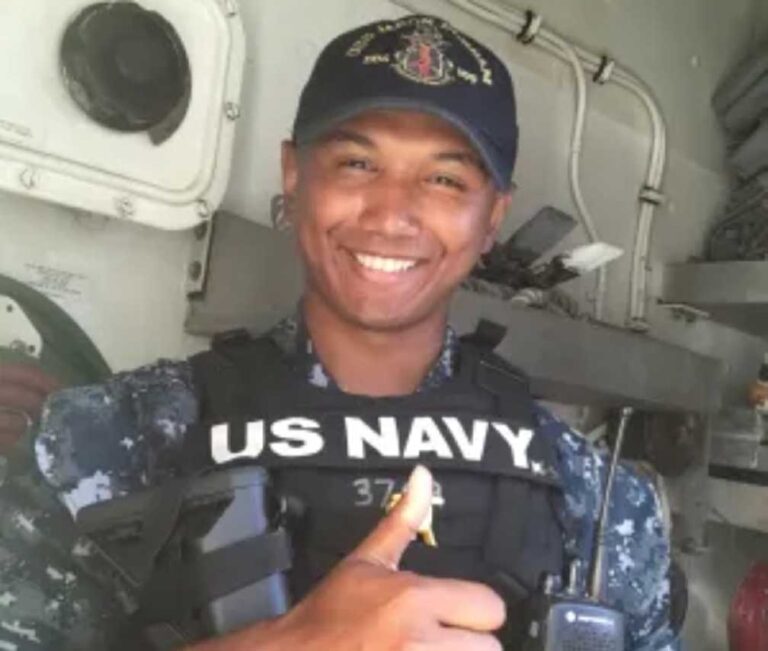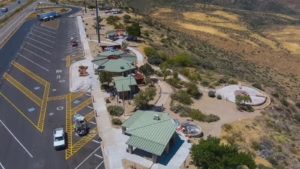Growing up in South Philadelphia, Sunny Lam’s journey to success at U.S. Customs and Border Protection (CBP) was anything but guaranteed.
Lam’s childhood was not ideal. His family was poor and moved constantly. His mother had gambling problem, and his father, a veteran who had served in Vietnam, struggled with PTSD.
When Lam was just 5 years old, his mother was murdered by his father.
Lam was sent to live for a few years with an aunt and uncle in South Philadelphia. At age 8 the relatives released Lam into the state’s foster care system. He was placed with a foster family in Bensalem, Pennsylvania, on the outskirts of Philadelphia.
His foster parents provided a loving and supportive environment. In fact, Lam still calls their house in Bensalem “home,” and he visits frequently.
However, neither foster parent had attended college, and when Lam was seeking a career path after high school, they didn’t know who to help him apply.
“I didn’t have a mentor growing up and I wasn’t necessarily good at school, so I needed to find a different route,” Lam said.
Military service
Lam ultimately chose the Navy, enlisting at the age of 23.
He was assigned to the destroyer USS Jason Dunham (DDG 109) as an Operations Specialist. In that role, Lam served as a “jack of all trades” on the ship, operating a variety of tools ranging from communications equipment to navigation and radar systems.
Because he’d never really been on the water, Lam didn’t realize he was prone to seasickness … until his first day on board.
“Every time we would come into port for a couple days, we’d go back out and then I’d get sick all over again,” Lam said. “I got seasick all the time.”
After five years on board the USS Jason Dunham, he transferred to “shore-duty” in a position within the Navy at the Joint Interagency Task Force South (JIATFS), a counter-narcotics command in Key West, Forida.
At JIATFS, he worked with personnel from “23 different 3-letter agencies” (including the CBP) and partner nations to target, detect and monitor illicit drug trafficking in the air and maritime domains in the joint operating area.
“A lot of illicit drugs would come up and we would send Coast Guard assets out,” Lam said. “We would send aircraft, partner nation aircraft, and we would task our units to [interdict drug smugglers].”
It was while working alongside CBP Air and Marine Operations (AMO) personnel at JIATFS that Lam first developed an interest in CBP.
“I saw their mission. I talked to some of the guys at AMO when we were down there; they said they loved what they were doing,” Lam said.
As he learned more about the agency, he was drawn to the breadth of the CBP mission.
“The mission space is very versatile,” he said. “You’ve got counter-narcotics, border protection, trade — CBP is literally everywhere.”
Life after military service
When Lam began to prepare for life after his military service, he did some digging into the Department of Defense SkillBridge Program and reached out to Jeff Jack, CBP’s national Veterans Employment Program Manager (VEPM).
“[Jack] was my first and really only contact,” Lam said. “I really wanted to get into CBP.”
Based on Lam’s military experience, he was put in touch with Kevin Cinco, a supervisor within what is now the Integrated Planning and Requirements Division (IPRD), under CBP Operations Support, Planning, Analysis & Requirements Evaluation Directorate (PARE).
In the IPRD, requirements specialists identify needed capabilities through operational-level mission analysis. Alongside his teammates, Lam verifies that CBP capabilities are directly tied to strategic outcomes — safety, security and prosperity — linking “what we need” to “why we need it.” This internal control process helps ensure that more than 66,000 CBP employees have the resources necessary for mission success.
Lam began a six-month SkillBridge internship in January 2023 under a predecessor of IPRD, with Cinco as his supervisor.
He says he saw a direct connection between his military service and his time spent in the SkillBridge program learning the role of a requirements specialist.
“As an Operations Specialist in the Navy, I was the end-user for all the programs that we used, using all of our capabilities,” Lam said.
This unique insight informed his efforts under SkillBridge.
“If Border Patrol needed something, I would try to think from a user perspective,” he said. “How would the user capitalize on this equipment? Is it safe to use?”
Following completion of his SkillBridge internship in July 2023, Lam was offered a permanent position with CBP. He entered on duty in October 2023 as a requirements specialist with IPRD.
Matt Andrews, Lam’s supervisor and a Navy veteran himself, believes that Lam dove right into his role in part because of the abilities he developed as an Operations Specialist in the Navy.
“The critical thinking, the ability to interpret evidence or data independently and then exercise judgment to make a good recommendation,” Andrews said, “those are really the foundational skills that [Lam] had that are extremely relevant to what he’s doing now.”
Looking back, Lam says his SkillBridge internship gave him the tools he needed to succeed in the role as a requirements specialist.
As he shadowed Cinco, Lam says he gained a wider view of the agency’s work while attending senior leadership meetings.
“There were questions that were asked (in the meetings), where now that I’m working on these requirements, I know what will be asked before it even gets there,” Lam said.
Describing Cinco’s impact on his career, Lam said: “I call him ‘Yoda,’ because he just knew everything — and anything that didn’t seem or sound right, he would always question it. I really learned a lot from him.”
A helping hand for others
Because he knew first-hand what it was like to be without a mentor, Lam found a calling to be a resource for others. He is part of a SkillBridge group on Facebook, where he shares his experience and encourages others to seek opportunities with CBP.
So far, he has been instrumental in helping three group members connect to Jack — and, thanks to Jack’s tireless advocacy as a Navy veteran himself, each of the three found SkillBridge opportunities. Two are now permanent employees with CBP and the third is a current SkillBridge intern at the agency.
Lam’s advice to other transitioning service members is this: Start early, have a plan, find a mentor and follow through.
“If you’re looking to do something, whatever it is, find a mentor so you can ask questions—someone you can always go to,” he said. “Start early and follow through.”
Dead reckoning
Lam’s background continues to propel him toward a bright future.
“Dead reckoning” — a traditional maritime method of estimating position and projecting forward — mirrors Lam’s own journey. From a young age, he was forced to reckon with the realities of his circumstances, yet he always believed he was meant for more.
His Navy service honed the foundational skills that now serve him at CBP. Though he couldn’t have predicted every step in his career, he’s moved forward with purpose and recently earned a promotion to a role that links task with purpose across CBP. His personal “will to win” fuels his success and inspires those around him.
Lam invites transitioning service members to contact him with questions about his journey, the SkillBridge program or how to navigate the transition process.
Transitioning service members can also contact Jeffrey Jack, CBP’s VEPM, at [email protected] to discuss how to participate in the DoD SkillBridge internship program within CBP. Learn more about CBP’s other veterans recruitment programs by joining the CBP Talent Network.
Linda Garner-Bunch has been with The Trucker since 2020, picking up the reins as managing editor in 2022. Linda has nearly 40 years of experience in the publishing industry, covering topics from the trucking and automotive industry to employment, real estate, home decor, crafts, cooking, weddings, high school sports — you name it, she’s written about it. She is also an experienced photographer, designer and copy editor who has a heartfelt love for the trucking industry, from the driver’s seat to the C-suite.











